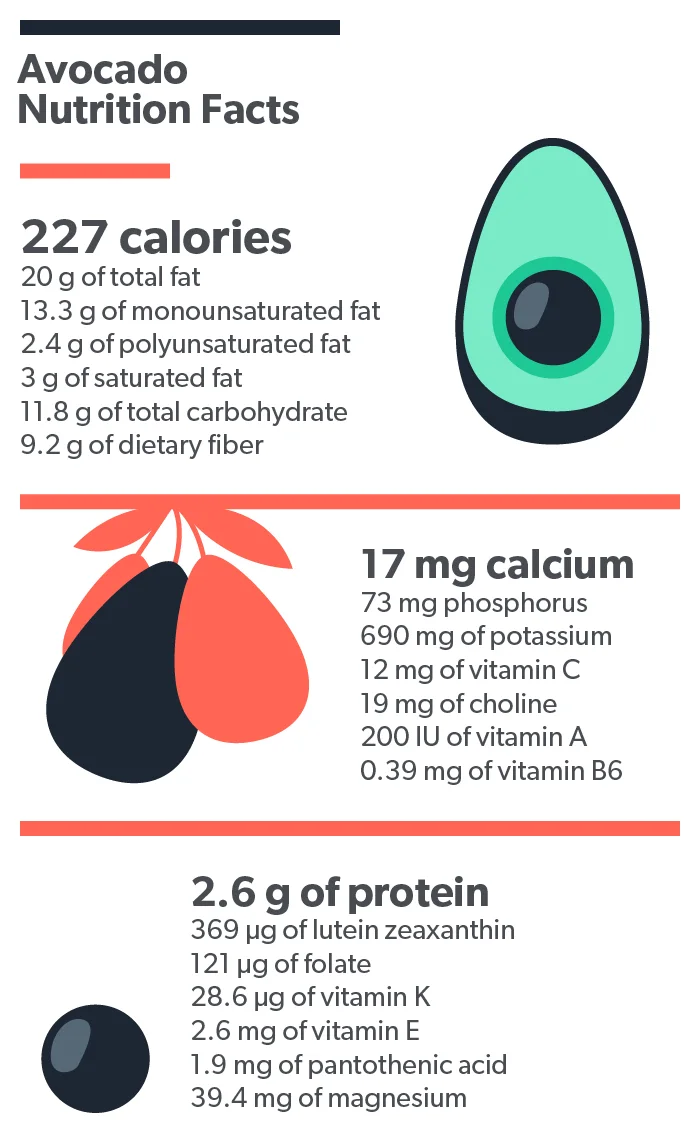Here's what we'll cover
Here's what we'll cover
It seems like every restaurant you go to now offers avocado toast on the menu. Often touted as a “superfruit,” avocados have grown in popularity for their delicious taste and claimed health benefits. Unlike most fruits that tend to be high in carbohydrates, avocados are known for their high-fat content.
So how many calories are in an avocado, and what nutrition benefits do they provide? This article provides the answers.
Avocado nutrition facts
While there are many types of avocados, Hass avocados have become the most popular type sold throughout the world. This variety was first grown in southern California.
Nutrition surveys show most people eat half of an avocado, even though the official serving size is one-fifth of an avocado (Dreher, 2013). According to the USDA, one whole medium avocado provides (USDA, 2019):

Health benefits of avocados
Regularly consuming avocados could benefit your health because they are full of dietary fats, fiber, vitamins, and minerals. Here are some of the potential health benefits of avocados:
May improve heart health
Yes, avocados are high in fat, but they primarily provide monounsaturated fatty acids. Research suggests saturated fat (like that found in red meat and butter) is more likely to contribute to heart disease if you overeat it. Monounsaturated fats are better for your heart health and may even help improve blood lipid levels (Dreher, 2013).
Good source of dietary fiber
Avocados are a great source of soluble fiber, with about 9.2 grams of fiber in one avocado, roughly one-third of your daily recommended value.
Soluble fiber binds to cholesterol, particularly low-density lipoproteins (LDL). LDL is considered the “bad” cholesterol because it is more likely to lead to plaques forming in your arteries. Soluble fiber may help lower LDL levels by 5–10% (Surampudi, 2016).
Soluble fiber also helps keep your bowel movements regular, improving both diarrhea and constipation. Finally, fiber can also help protect you from illnesses like type 2 diabetes and colon cancer (Barber, 2020).
Keeps you full longer
Both fat and fiber slow down the digestive system. It takes longer for these to be broken down, meaning they can help keep you feeling full longer. This may prevent overeating, helping with weight maintenance and supporting your healthy weight goals.
Helps stabilize blood sugar
Avocados may help to keep your blood sugar levels more stable after meals. Research shows eating half or a whole avocado leads to lower insulin and glucose levels in the blood for 4–6 hours following a meal (Park, 2018).
May lower your risk for metabolic syndrome
Metabolic syndrome is a grouping of conditions that increase your heart disease, stroke, and diabetes risk. The conditions included in metabolic syndrome are high blood pressure, high blood sugar, excess body fat around the waist, and abnormal cholesterol levels.
Research suggest avocados help reduce the risk for metabolic syndrome by (Park, 2018):
Keeping blood sugar more stable
Reducing LDL cholesterol
Has antioxidant properties
Some of the vitamins and minerals in avocados act as antioxidants, which help protect your body from damage caused by oxidative stress. Exposure to oxidative stress increases your risk for diseases like cancer, Parkinson’s disease, and Alzheimer’s disease. Eating avocados regularly may help lower your risk of developing these chronic diseases (Ameer, 2016; Pizzino, 2017).
Any possible side effects of eating avocados?
If you consume avocados in moderation, there are minimal risks. Still, avocados are high in fat and calories. If you add avocados to your diet and want to maintain your current weight, make sure they are replacing another part of your meals. Simply adding avocados without making other dietary changes may lead to extra calorie intake and possibly weight gain (which may be beneficial if you’re bulking).
Try substituting avocado for a food high in saturated fat, like butter or dairy products.
Some people have trouble digesting fat. If that’s the case, you may want to avoid or limit avocados.
Ideas for adding avocados to your diet
Avocados add a savory flavor to your meals. Here are a few ways to include avocados in your meals:
Make guacamole to use as a dip or spread for sandwiches, wraps, or salads.
Top eggs or meat with avocado slices.
Spread mashed avocado over toast.
Use as a substitute for mayonnaise in chicken, tuna, or egg salad.
The nutrients in avocados provide health benefits when consumed as part of a healthy diet. Still, they might not be the right choice for everyone, especially if you’re sensitive to high-fat foods. Consider making them part of your diet to benefit your heart health, lower your diabetes risk, and make your bowel movements more regular.
DISCLAIMER
If you have any medical questions or concerns, please talk to your healthcare provider. The articles on Health Guide are underpinned by peer-reviewed research and information drawn from medical societies and governmental agencies. However, they are not a substitute for professional medical advice, diagnosis, or treatment.
Ameer, K. (2016). Avocado as a major dietary source of antioxidants and its preventive role in neurodegenerative diseases. Advances In Neurobiology, 12, 337–354. doi: 10.1007/978-3-319-28383-8_18. Retrieved from https://pubmed.ncbi.nlm.nih.gov/27651262/
Barber, T. M., Kabisch, S., Pfeiffer, A., & Weickert, M. O. (2020). The health benefits of dietary fibre. Nutrients, 12 (10), 3209. doi: 10.3390/nu12103209. Retrieved from https://www.ncbi.nlm.nih.gov/pmc/articles/PMC7589116/
Dreher, M. L. & Davenport, A. J. (2013). Hass avocado composition and potential health effects. Critical Reviews In Food Science And Nutrition, 53 (7), 738–750. doi: 10.1080/10408398.2011.556759. Retrieved from https://www.ncbi.nlm.nih.gov/pmc/articles/PMC3664913/
Park, E., Edirisinghe, I., & Burton-Freeman, B. (2018). Avocado fruit on postprandial markers of cardio-metabolic risk: a randomized controlled dose response trial in overweight and obese men and women. Nutrients, 10 (9), 1287. doi: 10.3390/nu10091287. Retrieved from https://www.ncbi.nlm.nih.gov/pmc/articles/PMC6164649/
Pizzino, G., Irrera, N., Cucinotta, M., Pallio, G., Mannino, F., Arcoraci, V., et al. (2017). Oxidative stress: harms and benefits for human health. Oxidative Medicine And Cellular Longevity, 2017,
doi: 10.1155/2017/8416763. Retrieved from https://www.ncbi.nlm.nih.gov/pmc/articles/PMC5551541/
Surampudi, P., Enkhmaa, B., Anuurad, E., & Berglund, L. (2016). Lipid lowering with soluble dietary fiber. Current Atherosclerosis Reports, 18 (12), 75. 10.1007/s11883-016-0624-z. Retrieved from https://pubmed.ncbi.nlm.nih.gov/27807734/












